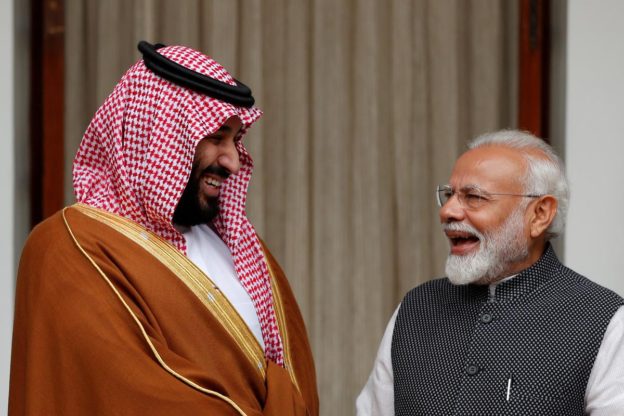During this pivotal meeting, Prime Minister Modi underscored the paramount significance of the India-Saudi Arabia partnership, deeming it “crucial for stability and welfare of the region and the world”.
After the conclusion of the G20 Leaders’ summit in New Delhi, a significant chapter in international diplomacy unfolded as Saudi Arabia’s Crown Prince Mohammed bin Salman Al Saud engaged in extensive discussions with Prime Minister Narendra Modi. Their dialogue centered around bolstering bilateral trade and defence ties. Furthermore, the two leaders jointly chaired the inaugural meeting of the India-Saudi Arabia Strategic Partnership Council (SPC).
During this pivotal meeting, Prime Minister Modi underscored the paramount significance of the India-Saudi Arabia partnership, deeming it “crucial for stability and welfare of the region and the world”. He expressed the commitment to expand and diversify their relations to align with the evolving global landscape, encapsulating the spirit of change and progress.
The meeting between Prime Minister Modi and the Saudi Crown Prince marked a transformative moment in the longstanding India-Saudi Arabia relationship. It signified a “new chapter” in their ties, symbolized by a warm welcome extended by PM Modi at Hyderabad House for bilateral discussions.
The Strategic Partnership Council, or SPC, was initiated in October 2019 during Prime Minister Modi’s visit to Riyadh. It encompasses two key committees: the Committee on Political-Security-Social & Cultural Cooperation and the Committee on Economy and Investment. The recent talks between both leaders followed the ministerial meetings of these committees held in September 2022 in Riyadh, showcasing the commitment to furthering this strategic partnership.
One of the most notable outcomes of the G20 Leaders’ Summit was the historic agreement between India, Saudi Arabia, the United States, and the European Union to establish a colossal India-Middle East-Europe shipping and railway connectivity corridor. Ausaf Sayeed, Secretary (CPV & OIA) at the Ministry of External Affairs, elaborated on this groundbreaking development, stating that India would be linked by railroad in a multinational Middle East-South Asia rail and ports corridor. This corridor, involving the United States, Saudi Arabia, India, the European Union, and the United Arab Emirates, is seen as a countermeasure to China’s ambitious Belt and Road Initiative, emphasizing the evolving global dynamics.
India-GCC FTA
During Crown Prince Mohammed bin Salman’s state visit to New Delhi, discussions also encompassed the possibility of trading in local currencies and expediting negotiations for a free trade agreement between India and the Gulf Cooperation Council (GCC), of which Saudi Arabia is a key member.
Addressing the long-pending India-Gulf Cooperation Council Free Trade Agreement, Secretary Sayeed affirmed the eagerness of both sides to accelerate the negotiation process. Delays in the past were attributed to the appointment of chief negotiators, but now, with these key appointments in place, negotiations are set to regain momentum, potentially unlocking significant trade benefits for both parties. Talks regarding trade in local currencies will start soon which will enhance economic cooperation further.
Energy Security
Energy security has always been a cornerstone of India-Saudi Arabia ties. In a special briefing at the conclusion of talks between PM Modi and the visiting Crown Prince, Secretary Sayeed disclosed that the two countries had inked eight agreements. These agreements include a pact to elevate their hydrocarbon energy partnership into a comprehensive energy partnership that encompasses renewable energy, petroleum, and strategic reserves. Saudi Arabia has consistently been one of the top petroleum exporters to India, underlining the critical role they play in each other’s energy security.
Speaking about the broader interconnectivity between India and Gulf countries, Secretary Sayeed emphasized that this partnership encompasses not just ports and railways but also improvements in roads, power infrastructure, gas grids, and an optical fiber network, illustrating the comprehensive nature of their cooperation.
Furthermore, Prime Minister Narendra Modi and the Saudi Crown Prince explored collaboration in diverse sectors, ranging from space exploration to semiconductors and defence manufacturing. This multifaceted approach demonstrates the intent to diversify and strengthen their partnership across various domains of mutual interest.
Status of USD 100 bn Investment Plan
A particularly noteworthy aspect of this burgeoning alliance is the ambitious USD 100 billion investment plan agreed upon by both countries. Half of this substantial sum is allocated to a delayed refinery project on India’s western coast, a project jointly executed by Saudi Arabian Oil Co (ARAMCO), Abu Dhabi National Oil Company (ADNOC), and Indian companies. To expedite the realization of this refinery project, a monitoring committee will be established, underscoring the shared commitment to its timely completion.
As for the remaining USD 50 billion in investments, India and Saudi Arabia have concurred on the establishment of a Joint Task Force to identify areas for investment. India has proposed sectors related to infrastructure as ideal recipients of this capital injection. These sectors encompass tourism, waterways, highways, gas grids, and renewable energy, reflecting a forward-looking approach to development.
https://www.financialexpress.com/business/defence-india-and-saudi-arabia-forge-stronger-bonds-a-closer-look-at-energy-security-defence-and-connectivity-3240148/





